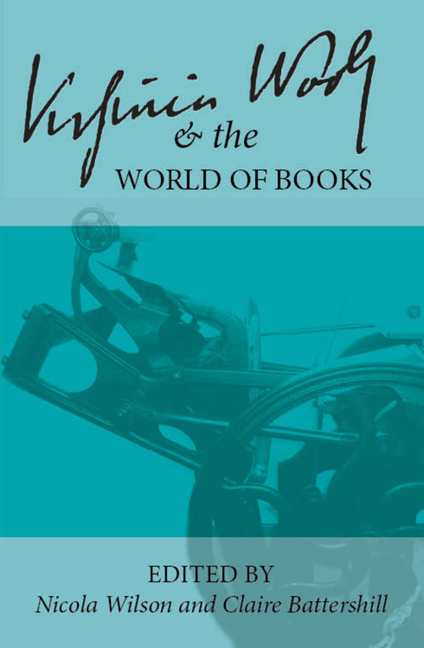 Virginia Woolf and the World of Books
Virginia Woolf and the World of Books Book contents
- Frontmatter
- Contents
- Introduction
- List of Abbreviations
- Keynote
- In the Archives
- Craftsmanship
- The Hogarth Press
- Hours in A Library
- Hours in a Library: Virginia Woolf and Leslie Stephen
- Two Libraries: Reading A Room of One's Own and Margaret Oliphant's “The Library Window”
- Bibliographers, Booksellers, and Collectors of the Hogarth Press
- The Art of the Book
- The Art of the Narrative
- Making New Books: Creative Approaches
- The Book in the World: Woolf's Global Reception
- Editing and Teaching Woolf
- Intertextuality
- Lives in Writing
- Notes on Contributors
Two Libraries: Reading A Room of One's Own and Margaret Oliphant's “The Library Window”
from Hours in A Library
- Frontmatter
- Contents
- Introduction
- List of Abbreviations
- Keynote
- In the Archives
- Craftsmanship
- The Hogarth Press
- Hours in A Library
- Hours in a Library: Virginia Woolf and Leslie Stephen
- Two Libraries: Reading A Room of One's Own and Margaret Oliphant's “The Library Window”
- Bibliographers, Booksellers, and Collectors of the Hogarth Press
- The Art of the Book
- The Art of the Narrative
- Making New Books: Creative Approaches
- The Book in the World: Woolf's Global Reception
- Editing and Teaching Woolf
- Intertextuality
- Lives in Writing
- Notes on Contributors
Summary
The library is a common locus in Virginia Woolf 's diary, letters and essays. From the “faded, out-of-date, obsolete” subscription library in which obscure lives lie buried (CR 1 106) to the private library of the man of letters which encourages the voracious reading of classics in “Hours in a Library” (E2 55–61), Woolf demonstrates her awareness of the enormous symbolical potential of this institution. Most famous of all however is Woolf 's semi-fictional Oxbridge library in A Room of One's Own, which refuses entry to women and thus becomes a symbol of the institutionalized sexism which prevents women and their works from entering into literary tradition.
In this paper, I would like to consider this famous library alongside a lesser known, but nevertheless important, one: that of Margaret Oliphant's ghost story “The Library Window” (1896). As a prolific writer of over one hundred novels, numerous works of biography and over three hundred articles for Blackwood's Edinburgh Magazine, Margaret Oliphant (1828–1897) at first glance appears an unlikely author to pair with Woolf. Her biographer Elizabeth Jay notes that “Her death amid the swiftly changing literary preoccupations of the end of the century made Margaret Oliphant a convenient symbol for the outdated female romancers of domestic fiction who had too often been prepared to sacrifice artistic integrity to financial need.” Woolf 's career as a critic began five years after Oliphant's death, and her only recorded opinion on Oliphant's life and works is hardly flattering. In Three Guineas, Woolf uses Oliphant as a dire warning for the dangers of poverty and its impact on the mind and body, deploring “the fact that Mrs Oliphant sold her brain, her very admirable brain, prostituted her culture and enslaved her intellectual liberty in order that she might earn her living and educate her children” (TG 217). Clearly, to Woolf, none of Oliphant's novels, biographies, travel writing or journalism belong in a well-stocked library. Nevertheless, I intend to follow in Emily Blair's footsteps and explore where similarities might exist between these superficially very different writers. Although they were written roughly thirty years apart, A Room of One's Own and “The Library Window” ask very similar questions about women's place in the literary establishment and their access to writing spaces.
- Type
- Chapter
- Information
- Virginia Woolf and the World of BooksSelected Papers from the Twenty-seventh Annual International Conference on Virginia Woolf, pp. 109 - 114Publisher: Liverpool University PressPrint publication year: 2018


